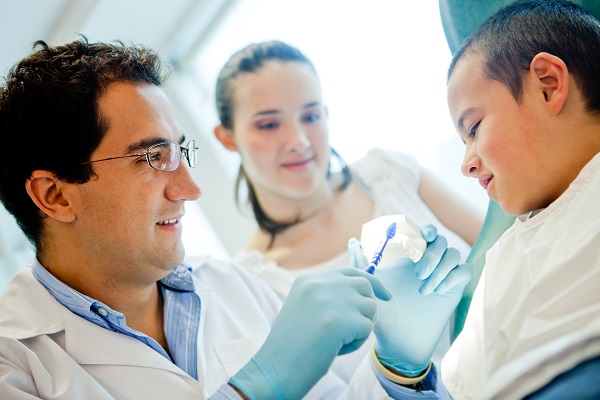Learn the Proper Way to Brush a Child’s Teeth From a Kid Friendly Dentist in Huntsville

According to a kid friendly dentist in Huntsville, it is imperative that parents begin to introduce good oral hygiene habits at an early age. That said, with all the things parents must teach their children, toothbrushing often falls by the wayside. Then there is the fact that many adults simply do not know how to teach children to properly brush their teeth. A kid friendly dentist can help with the teaching process and hold parents accountable for young patients' oral health.
When parents should introduce brushing
Many parents wait until a child's first tooth erupts to begin cleaning the mouth, but really, oral hygiene habits can and should begin as early as infancy. A mother or father can wipe a baby's mouth with a damp cloth after each feeding. Doing this helps the baby grow used to the sensation of having the mouth cleaned, so that by the time the first tooth does erupt and brushing is necessary, the baby will not reject a toothbrush.
Tips from a kid friendly dentist in Huntsville
It is not uncommon for parents to let a toddler wield a toothbrush and have at it. While it is great for parents to encourage toddlers to be independent, teeth brushing is something adults should take over until the child is school age, maybe older. Below are some tips to get parents started.
Fluoridated toothpaste and toothpaste amounts
When brushing an infant or baby's mouth, parents should use water. Parents who wish to use any type of fluoridated product should run it by a dentist first. When a child is about two years old, parents can introduce the toddler to age-appropriate toothpaste. From ages two to about five, only a pea-sized amount of toothpaste should be used.
Encouraging independence
As mentioned, a parent should brush a child's teeth for them until the child is of school age. Children are typically capable of brushing their own teeth starting between the ages of six and eight. However, parents should continue to thoroughly inspect a kid's teeth to ensure no spots are missed.
Frequency of toothbrushing
Children should brush and floss as often as adults should. That means twice a day, once in the morning and once right before bedtime. Of course, every child's oral health differs, so parents should discuss an adequate routine with the dentist.
Replacing toothbrushes
A child's toothbrush needs to be replaced as frequently as an adult's, which is every three to four months. However, if a toothbrush looks worn or frayed, it is okay to throw it out sooner. When children get colds or the flu, parents should toss out the old toothbrushes to prevent the reintroduction of germs.
Conclusion
Parenting is not easy, as many learning curves are involved. Fortunately, there are plenty of professionals who are willing and able to help, such as a kid friendly dentist in Huntsville. Parents who have questions regarding the oral health and hygiene of an infant, toddler or school-aged child should contact a family dentist.
Request an appointment here: https://www.smilesbydesignhuntsville.com or call Smiles by Design, PC at (256) 660-3233 for an appointment in our Huntsville office.
Check out what others are saying about our services on Yelp: Read our Yelp reviews.
Related Posts
For those dealing with crooked teeth or an uneven smile, Invisalign® is a teeth-straightening alternative to metal braces. Wearing a dental device potentially impacts an individual’s self-esteem, and traditional wire braces can detract from looking professional or mature. Clear aligners offer similar results to metal braces without the same highly visible profile. The entire treatment…
Dentists perform dental cleaning to prevent problems like tooth decay and gum disease. A dental cleaning procedure is more intensive than your daily oral hygiene routine.Read on to find out why aftercare is necessary after a dental cleaning. The following also explains how to care for your teeth after professional teeth cleaning.Dentists advise their patients…
The American Dental Association recommends that people visit the dental office once every six months for dental cleaning and checkups to discourage bacteria colonies from developing and causing dental problems like tooth cavities and gum disease. Professional dental cleanings will eliminate plaque, while dental examinations will enable your general dentist to assess the condition of…
There are generally no preparations that are required for a dental cleaning. However, there are certain things that you can do to help ensure the visit goes well. This is particularly useful for patients that may have dental anxiety or not know what they should expect for the visit.The best ways to prepare for dental…
